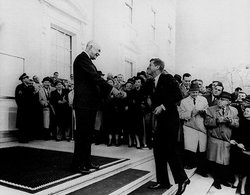U.S. presidential election, 1960
|
|
ElectoralCollege1960-Large.png
The U.S. presidential election of 1960 was held on November 8, 1960.
After eight years of Eisenhower's presidency, voters were generally happy with the Eisenhower administration, but many continued to have concerns about the Cold War. Under the provisions of the 22nd amendment, Eisenhower was disqualified from running because he had been elected twice. The Republican nomination instead went to Eisenhower's vice president, Richard M. Nixon. The Democrats nominated Senator John F. Kennedy of Massachusetts. After a very close race, Kennedy came out on top.
| Contents |
Nominations
Republican Party nomination
Vice President Richard M. Nixon faced little opposition for the Republican nomination. He chose former Senator and Ambassador Henry Cabot Lodge, Jr. as vice presidential candidate. Barry Goldwater was nominated, but declined the nomination and supported Richard Nixon.
Democratic Party nomination
Nytimes1960electionpage.jpg
Candidates for the nomination included:
- Massachusetts Senator John F. Kennedy
- Texas Senator Lyndon Johnson
- Minnesota Senator Hubert Humphrey
- California Governor Pat Brown
- Ohio Governor Michael V. DiSalle
- Oregon Senator Wayne L. Morse
- Florida Senator George A. Smathers
- Missouri Senator Stuart Symington
Kennedy's Catholic religion was raised as an issue by some factions, but in the end Kennedy's youth and war record impressed delegates, and his popularity and campaign spending carried the day. Kennedy chose Johnson as vice presidential candidate to balance the ticket and secure Southern votes.
Other nominations
Independent candidate Harry F. Byrd, a maverick segregationist Democrat, received 15 electoral votes; 14 from unpledged Democratic electors and one from an elector pledged to Nixon. If these votes had all gone to Nixon, Kennedy would still have won the election.
General election
Campaign
A crucial factor in this election was the first televised presidential debate. Nixon refused television makeup and was feeling sick, because he injured his knee on the way to the studio. He expected to win voters with his foreign-policy expertise, but people only saw a sickly man sweating profusely and wearing a gray suit that blended into the scenery while his rival, Kennedy, looked great. Later research showed that those who had listened to the debate on radio thought Nixon had won, but the television audience gave the win to Kennedy. Nixon's negative experience in the debates caused him to shun debates in his 1968 and 1972 campaigns, and the next presidential debates would not be held until 1976.
The main economic issue during the election was the USSR's high economic growth rate in comparison to the United States'. According to analyses at the time, the Soviet economy was expected to overtake the American economy by 1984. Kennedy also claimed the Republican administration had allowed a missile gap by not matching Soviet defense spending and allowing the military to weaken. The claim was made plausible by Soviet superiority in the space program, evidenced by their successful Sputnik program and numerous US launch failures. However, there is evidence there never was a gap as far as missiles were concerned.
Still, the election was close and Kennedy only defeated Nixon by two tenths of a percentage point (0.2%.) Some speculate that Kennedy benefited from vote fraud especially in Texas and Illinois. There is no certainty that Nixon would have won both Texas and Illinois (which he would have had to do to win the Electoral College vote). What is certain, however, is that in Illinois, Kennedy won by a bare 9,000 votes, and Mayor Daley, who held back Chicago's vote until late in the evening, provided an extraordinary Cook County margin of victory of 450,000 votes. No thorough investigation of the massive irregularities was ever conducted, and partisans of Kennedy and Nixon still debate the bottom line"[1] (http://www.leanleft.com/archives/cat_reviews.html). The Republican party urged Nixon to pursue recounts and challenge the validity of some of the votes for Kennedy, especially in the pivotal states of Illinois, Missouri and New Jersey, where marginal wins handed Kennedy the election. Nixon publicly refused to call for a recount, saying it would cause a constitutional crisis. However, privately, he encouraged GOP Chair Thurston Morton to push for a recount, which Morton did in 11 states, keeping challenges in the courts into the summer of 1961; the only result was the loss of the State of Hawaii to Kennedy on a recount.
The actual number of votes received by Byrd and Kennedy are difficult to determine. In Alabama, the statewide primary had chosen eleven electors, five of which were pledged to vote for Kennedy, and six of whom were free to vote for anyone they chose. The ballot gave voters a choice between Nixon and a slate of Democratic unpledged electors. It is unclear how many of the 318,303 Democratic votes in Alabama were for Byrd, and how many were for Kennedy. This margin is easily large enough to make Nixon the winner of the popular vote instead of Kennedy.
Byrd received electoral votes for President from Alabama (6), Mississippi (8) and Oklahoma (1). Thurmond received electoral votes for Vice President from Alabama (6) and Mississippi (8). Goldwater received one electoral vote for Vice President from Oklahoma.
Results
Template:Start U.S. presidential ticket box Template:U.S. presidential ticket box row Template:U.S. presidential ticket box row Template:U.S. presidential ticket box rowspan Template:U.S. presidential ticket box vp subrow Template:U.S. presidential ticket box other Template:End U.S. presidential ticket box
Sources:
- U.S. Office of the Federal Register (http://www.archives.gov/federal_register/electoral_college/scores.html#1960)
- Office of the Clerk of the United States House of Representatives (http://clerk.house.gov/members/electionInfo/elections.html) (for Byrd)
See also
- President of the United States
- U.S. Senate election, 1960
- History of the United States (1945-1964)
- Canada and the 1960 U.S. presidential election
Template:Uspresidentialelections
Reference
External link
- 1960 election results - state-by state popular vote (http://www.multied.com/elections/1960state.html)

